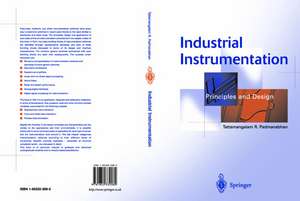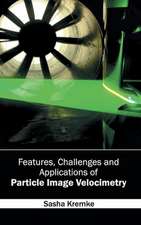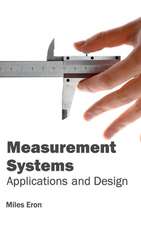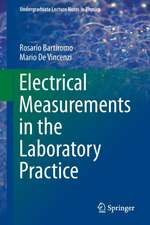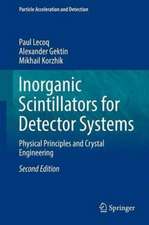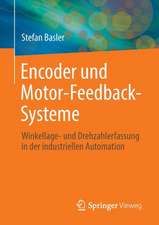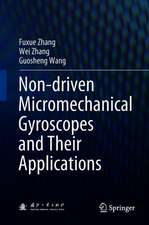Industrial Instrumentation: Principles and Design
Autor Tattamangalam R. Padmanabhanen Limba Engleză Hardback – 12 dec 1999
| Toate formatele și edițiile | Preț | Express |
|---|---|---|
| Paperback (1) | 962.18 lei 6-8 săpt. | |
| SPRINGER LONDON – 30 oct 2012 | 962.18 lei 6-8 săpt. | |
| Hardback (1) | 1242.66 lei 6-8 săpt. | |
| SPRINGER LONDON – 12 dec 1999 | 1242.66 lei 6-8 săpt. |
Preț: 1242.66 lei
Preț vechi: 1515.44 lei
-18% Nou
Puncte Express: 1864
Preț estimativ în valută:
237.81€ • 247.36$ • 196.33£
237.81€ • 247.36$ • 196.33£
Carte tipărită la comandă
Livrare economică 14-28 aprilie
Preluare comenzi: 021 569.72.76
Specificații
ISBN-13: 9781852332082
ISBN-10: 1852332085
Pagini: 668
Ilustrații: XXII, 643 p.
Dimensiuni: 155 x 235 x 41 mm
Greutate: 1.16 kg
Ediția:2000
Editura: SPRINGER LONDON
Colecția Springer
Locul publicării:London, United Kingdom
ISBN-10: 1852332085
Pagini: 668
Ilustrații: XXII, 643 p.
Dimensiuni: 155 x 235 x 41 mm
Greutate: 1.16 kg
Ediția:2000
Editura: SPRINGER LONDON
Colecția Springer
Locul publicării:London, United Kingdom
Public țintă
Professional/practitionerDescriere
Pneumatic, hydraulic and allied instrumentation schemes have given way to electronic schemes in recent years thanks to the rapid strides in electronics and allied areas. Principles, design and applications of such state-of-the-art instrumentation schemes form the subject matter of this book. Through representative examples, the basic building blocks of instrumentation schemes are identified and each of these building blocks discussed in terms of its design and interface characteristics. The common generic schemes synthesized with such building blocks are dealt with subsequently. This forms the scope of Part I. The focus in Part II is on application. Displacement and allied instrumentation, force and allied instrumentation and process instrumentation in terms of temperature, flow, pressure level and other common process variables are dealt with separately and exhaustively. Despite the diversity in the sensor principles and characteristics and the variety in the applications and their environments, it is possible judiciously to carve out broad areas of application for each type of sensor and the instrumentation built around it. The last chapter categorises instrumentation schemes according to their different levels of complexity. Specific practical examples - especially at involved complexity levels - are discussed in detail.
Cuprins
I Principles and Components.- 1 Instrumentation Schemes Structure and Specifications.- 2 Secondary Transducers.- 3 Operational Amplifiers.- 4 Linear Signal Processing.- 5 Active Filters.- 6 Non-linear Signal Processing.- 7 Noise and System Performance.- 8 Analog-Digital Interface.- 9 Digital Signal Processing for Instrumentation.- 10 Generic Structures of Instrumentation Schemes.- 12 Force and Allied Instrumentation.- 13 Process Instrumentation I.- 14 Process Instrumentation II.- 15 Process Instrumentation III.- 16 Typical Instrumentation Schemes.- Appendix A.- Appendix B.- Appendix C.- Appendix D.- Appendix E.- Appendix F.- References.
Notă biografică
Caracteristici
The treatment is centred around electronic instrumentation schemes, as is the current practice
Designers will learn to understand the building blocks of control schemes, their characteristics, limitations and interface considerations so that they can structure their schemes appropriately to individual applications
The structure of control schemes is explained for applications engineers using applied schemes of various complexity
Designers will learn to understand the building blocks of control schemes, their characteristics, limitations and interface considerations so that they can structure their schemes appropriately to individual applications
The structure of control schemes is explained for applications engineers using applied schemes of various complexity
